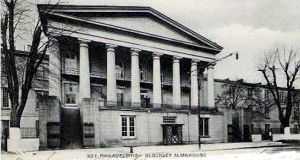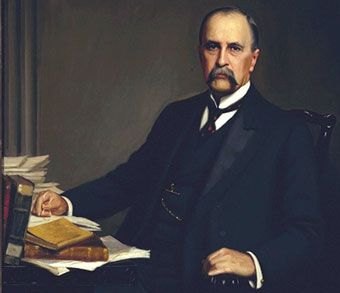Related Topics
West of Broad
A collection of articles about the area west of Broad Street, Philadelphia, Pennsylvania.
Philadelphia Medicine
The first hospital, the first medical school, the first medical society, and abundant Civil War casualties, all combined to establish the most important medical center in the country. It's still the second largest industry in the city.
Volunteerism
The characteristic American behavior called volunteerism got its start with Benjamin Franklin's Junto, and has been a source of comment by foreign visitors ever since. It's still a very active force.
Indigents
With a long history of welcoming and assisting the poor, Philadelphia has always risked swamping the lifeboat by attracting more of them than it can handle.
Touring Philadelphia's Western Regions
Philadelpia County had two hundred farms in 1950, but is now thickly settled in all directions. Western regions along the Schuylkill are still spread out somewhat; with many historic estates.
Favorite Reflections
 In no particular order, here are the author's own favorites.
In no particular order, here are the author's own favorites.
Favorites - II
More favorites. Under construction.
Old Blockley (P.G.H.)

|
|
Old Blockley
|
For a long time, the Philadelphia General Hospital was the largest hospital in town, even growing briefly to seven thousand patients during the Civil War, but leveling off at about three thousand at the beginning of the Twentieth Century. At the end of World War II, it had shrunk to about 1500 beds, but it was Medicare and Medicaid in 1965 which finally did it in. By 1977 it was costing the City of Philadelphia about five million dollars a year beyond its revenues to run the place with only 300 patients, while the running expenses of the local private hospitals were actually less, per patient. Titles XVIII(Medicare) and XVIV(Medicaid) of the Social Security act constituted Lyndon Johnson's Great Society, and in effect they made every patient at PGH resemble a walking government check in the mind of hospital administrators. The local hospital association made the argument to the Mayor Rizzo that everybody would be better off if the hospital closed and those government checks were directed to the local voluntary institutions. After a few years, the federal government inevitably squeezed the generosity out of the bargain they would of course now like to abandon. But that's the way it goes. PGH is gone and it isn't coming back. The eighteen acres in Blockley Township, now West Philadelphia, were given to the University of Pennsylvania next door, and gigantic amounts of federal money were contributed to the building of skyscrapers replacements for the original PGH. Ironically, the two hundred children's beds now on the location are fewer in numbers than the three hundred adults once considered too uneconomically few to maintain, and the cost per day of hospitalization is roughly ten times the PGH cost which had been described as unsupportable. The rest of the real estate is built up with buildings involved in medical research, which is also an activity dedicated to working for its own extinction. Discovering a cheap cure for cancer would quickly create a need to fill the vacancies with something else. No one regrets this system of creative destruction, but everyone should regret the diminution of the spirit of local philanthropy which underlay it.
PGH was one of a dozen or so big-city charity hospitals, like Bellevue in New York, Charity in New Orleans, or Cook County Hospital in Chicago. Of these hospitals, PGH had surely been the best, and at the turn of the Twentieth Century a Mayor's commission issued a report about the place which began, "Philadelphia can surely be proud...." Having worked in Bellevue and having visited most of the rest, I can testify that was likely true. When PGH was finally torn down, the walls and floors had such substantial construction that changing the wiring and plumbing to some other purpose had become almost impossible. The PGH nurses were famous for running. Although the alcoholic and drug-addicted patients might be called the dregs of society, the alacrity of the student nurses in running them bedpans or answering other calls, was spectacular to watch. When a doctor came on the floor, they jumped to their feet and were usually ready with the patient's charts, unmasked. Unlike Bellevue, where the floors were creaky and wooden, the open wards at PGH were spacious, clean, well maintained and equipped. At Bellevue, the forty-bed wards were crowded with sixty or seventy patients, so close together you could almost roll from one end of the room to the other without touching the floor. I can remember seeing one seventeen-year-old Bellevue student nurse tending such award at night alone, the intern sharpening needles, and the medical resident developing electrocardiograms in the darkroom. None of this would have seemed acceptable at PGH.

|
|
Dr. William Osler
|
Old Blockley was the place where modern systems of medical education originated. Up until William Osler came to Philadelphia, medical education mostly consisted of attending eight hours of lectures a day. Osler had an electrifying personality and wandered among the sick at PGH with a train of students following him. He is much quoted, and once suggested his obituary ought to read, "Here lies the man who took the students into the wards." A somewhat more elegant statement of the value of the practical experience was included in his dedication speech at the Boston Library: "To treat patients without books is to sail an uncharted sea. To read books without seeing patients is never to go to sea at all. Osler was somewhat underappreciated during his time in Philadelphia and went on to found the medical school at Johns Hopkins in Baltimore. Nevertheless, the main reason he later left John Hopkins and went to Oxford was his dismay at the adoption of the "full-time" system, which is to say the faculty stopped having a private practice of their own to act as a gold standard for their research and teaching. When all is said and done, there are some areas of discomfort in the transition of students from observers to actors. The PGH system of learning surgery was commonly reduced to a slogan, "See one, do one, teach one,"; things have progressed to the point where it is probably right for the public to insist on greater supervision and control than the old almshouse provided.
The disappearance of old Blockley ended a controversy, or even something of a mystery, about which was the oldest hospital in America, PGH or the Pennsylvania Hospital at 8th and Spruce. There had been an infirmary in Old almshouse at Eleventh Street, and there is no doubt the almshouse was there first. PGH grew out of the almshouse. However, there were many comments at the time of the founding of the Pennsylvania Hospital that it was now the first; that's a strange thing to say when the almshouse was three blocks away. Social historians need to look into the mindset of colonial America, which seems to have included the distinction between the worthy poor and the unworthy poor. Somehow, the founding principal of the Pennsylvania Hospital was to get people back to work who were capable of productive work, possibly even paying for itself in that way. In their minds, apparently just giving solace and help to those who were down and out was not quite the same thing.
Originally published: Friday, June 23, 2006; most-recently modified: Wednesday, May 22, 2019
| Posted by: Concerned citizen | May 29, 2018 1:33 PM |
| Posted by: Michael Edward Reif | Jun 24, 2016 1:04 PM |
| Posted by: Gloria Joan Williams | Apr 15, 2016 5:06 AM |
| Posted by: Thay Walker Shippen | Jul 11, 2014 1:58 PM |
| Posted by: Mary Ann Fisher | Apr 22, 2014 6:19 PM |
| Posted by: Francine Chase | Jan 25, 2014 3:32 AM |
| Posted by: Maggie | Jun 24, 2013 6:11 PM |
| Posted by: Pat | May 11, 2013 3:38 PM |
| Posted by: Joanna Yuninger | Mar 10, 2012 9:33 AM |
| Posted by: Parmelia | Nov 23, 2011 10:24 PM |
| Posted by: Sandy | Mar 6, 2011 6:54 PM |
| Posted by: Carol Roberts | Sep 30, 2010 10:31 AM |
| Posted by: Taabu Porter | Dec 20, 2009 10:33 PM |
| Posted by: jeanne kiefner | Aug 8, 2009 1:51 PM |
| Posted by: Esther Williams | Mar 18, 2009 3:13 PM |
| Posted by: tanya lewis | Jun 23, 2008 4:40 PM |
 In no particular order, here are the author's own favorites.
In no particular order, here are the author's own favorites.

